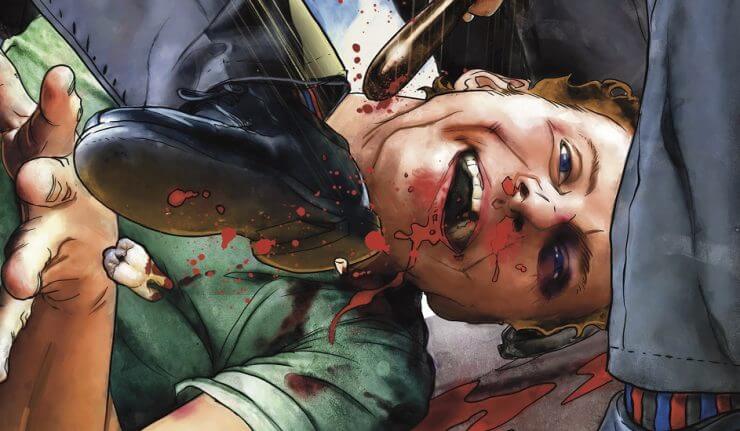Money can’t buy you happiness, or so they say. And citizens certainly can’t rely on the government to make our happiness its priority — unless, of course, the government makes it illegal to be unhappy, as with Peter Milligan’s Happy Hour.
“In future America, being happy isn’t just a right—it’s the law. While the Joy Police brutally enforce the cheery code, two young people go on the run, searching for a haven of melancholy where they can safely bask in the blues. This is Happy Hour, a dystopian satire from writer Peter Milligan and artist Michael Montenat about a world where being unhappy is illegal.”
Here, Milligan tells us all about what makes him happy and what we can expect from Happy Hour, now available in trade from Ahoy Comics.
What makes you happy?
A lot of things make me happy (besides questions like this). Let’s see:
- Spending time in a book shop — second hand or new — and not necessarily buying anything.
- Seeing a finished comic that I’ve written for the first time and being satisfied that it’s doing all I wanted it to do. Doesn’t happen all the time — but Happy Hour, when I opened that box, made me very happy.
- Going to an art exhibition I’ve been looking forward to. The exhibition itself might make me feel many things but headed towards it is usually a pretty happy and hopeful experience.
I could go on…
Were there particular happy or unhappy incidents that inspired this story?
Not so much incidents as a series of reflections and observations. When I first started to go to the USA, I was struck by how happy people were. At least, there was a kind of upbeat quality or sheen to a lot of social transactions. Yes, I knew that that waitress on shitty wages doing a job that rotted her mind wasn’t really as cheery as she came across as — but she gave a damned good impression. At the same time, there was that other side of New York, that in your face, I don’t give a fuck what you think about me quality. Both were quite alien to what I’d come from in the UK, which tended to adopt a kind of middling borderline miserable stance; really neither happy nor unhappy.
I think the first tiny seeds of a story where happiness was not only encouraged but a legal obligation started here. Years later I read a book by British psychologist Adam Philips where he talked about how some of his patients view unhappiness as an illness in need of a cure. Happy Hour started to come together…
Tell us a bit about the main characters. Are they the kind of people you’d like to hang out with?
I can’t say there are many characters in this book I’d invite to an intimate dinner party.
Jerry and Kim are our main characters, our heroes. When we first meet Jerry he’s like most of the country, blithely happy even in the face of tragedy. But a bang on the head changes everything and lands him in a “readjustment center” where he meets Kim, an Olympic martial arts bronze medalist. Kim’s in the center because she showed her displeasure at not winning gold. Jerry and Kim bond — they want the right to be unhappy. Problem is, their feelings for each other soon make unhappiness very difficult.
Pitched against them will be the forces of happiness, as personified by Agents Sullivan and McSmith. McSmith in particular will put up with about anything… and think only of how gggggreat lunch was.
The other main character is Landor Cohen, that satrap of sadness. Landor has created a colony of melancholy somewhere in Mexico. It’s here where Jerry and Kim head — with unexpected results.
At one point in the story, cell phones are removed from our protagonists. Do you feel the evolution of our technology, communications, and access to information is a detriment or benefit to our happiness?
Definitely a detriment. We’re bombarded by information and news. But most people – me included — are so stupid we don’t have the brains to process that information. And this makes us unhappy — or at least, more stupid, which in turn makes us less happy (or maybe more happy, depending on which way you comb your hair).
Sometimes I think it’d be best if we all still lived in caves. Albeit caves with access to central heating, penicillin, printing presses, Spotify, and a movie-streaming device. Oh, and Skype. And maybe the ability to make a call or send a text occasionally. And a nice little Indian restaurant around the corner would be appreciated.
What do you hope readers will take away from your story?
Happy Hour is a story about laughter which is no laughing matter. Yes, it’s funny, and yes, it’s surreal and moving (I hope!) — but there is a darker, more serious point that I hope the discerning reader takes away. The way governments perform a kind of stage magician’s sleight of hand, forcing you to look away from what’s REALLY going on. As the state in Happy Hour discovers, rather than fix the real problems of society it’s so much easier to fix people so they’re indiscriminately happy — just like that under-paid, bored-out-of-her-brains waitress who fixes you with a beatific smile and says “have a great day!” Whereas what she should be saying is:
“Viva la revolución!”




